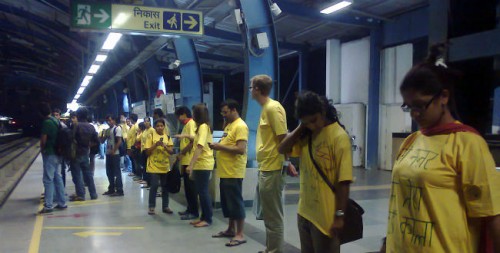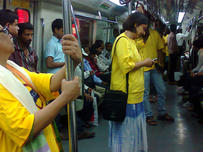Putting the brakes on sexual harassment – in the Delhi Metro
A bouquet of people in yellow clothes congregate on a busy New Delhi metro platform. They are men and women, old and young, but all dressed in slogan-strewn, canary yellow

A bouquet of people in yellow clothes congregate on a busy New Delhi metro platform. They are men and women, old and young, but all dressed in slogan-strewn, canary yellow shirts. “Share, don’t stare”. “Real men respect women”. “Respecting women is masculine”.
They string into a long line, and wait for a few trains to pass. After giving commuters time to read the slogans, the people in yellow board the next train. They spread out over the carriages, reading books or listening to music like ‘normal’ passengers.
Mobbing for a cause
“The Delhi metro has rules that categorically disallow any kind of sloganeering, and protest with posters and banners within the metro,” says Malini Kochupillai. She is one of the organisers of this flash mob, and part of Please Mend the Gap, a volunteer initiative to promote gender equality in Delhi’s public spaces. Three similar flash mobs have been held in the metro since April.
“It’s as much about asking for respect as about making people aware that eve-teasing, staring, and generally being disrespectful to women is not acceptable,” Kochupillai says. “More often than not, women will keep quiet, allowing the perpetrator continue their bad behaviour.”
Dark inspiration
The inspiration for the flash mobs came when Dharini Bhaskar, a young working woman, was abused by a man in the metro. A man on the train slapped her breast, and Bhaskar says the experience went from bad to worse when she tried to get help from security.
“All the men kept screaming ‘It’s a tiny matter’, ‘We’re working men. Move out of the doorway!’” Bhaskar says. “Finally, two policemen ambled in. They questioned the man, half-heartedly tried to drag him out. But [they] failed, as all the men rallied around the offender, claiming that I was instigating trouble.”
When Bhaskar went to the local police station, she was told to go to a metro office at the other end of town. She says the metro employees also didn’t help. “They said that the police did nothing because I had been unable to identify the assailant. Nothing could be further from the truth.”
Bright hopes

Besides the flash mobs, Please Mend the Gap is gathering signatures on an online petition, demanding better information and complaint facilities for women who’ve been harassed or assaulted. “Once the basic minimum acceptable standards of security and regulations are achieved, only then can we try and change attitudes of society towards gender equality,” says Varun Santhosh, who has also been involved in the initiative.
Solutions for the long or short term?
Until then, Santosh believes that a separate travel compartment for women might be necessary. ”As a man, firstly I am ashamed that there was a perceived and real threat [to women]. In my personal opinion, [separate compartments for men and women are] not the best solution, as it divides the society. But reservation can be a stop-gap solution to ensure safety of women.”
Despite the discussion and media attention that Please Mend the Gap has generated in the past couple of months, Bhaskar thinks that the fight is far from over. “I do not feel victorious. I feel sad that – even today as we make claims of being a burgeoning economy – women are viewed as the second sex. The longer we toe the line and say, ‘We’ll travel separately, we’ll cover ourselves up, we’ll suffer abuse and look away,’ the less likely we are to get empowered.”
This story made me
- 97
- 121
- 89
- 167











